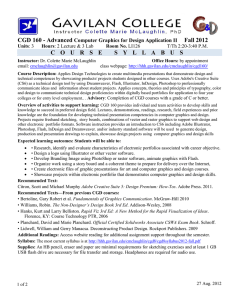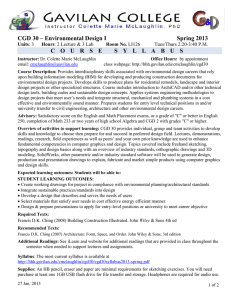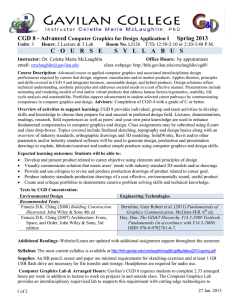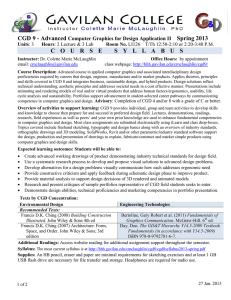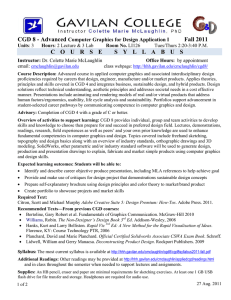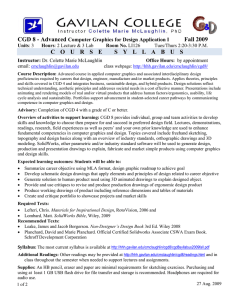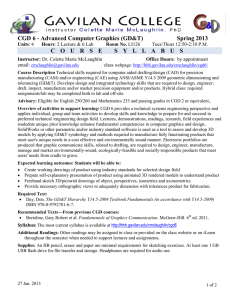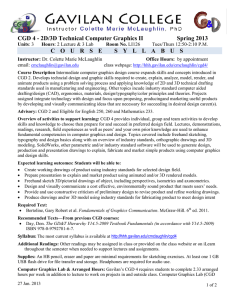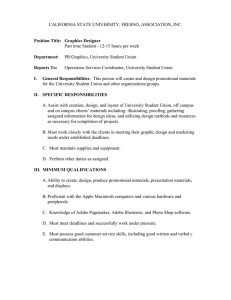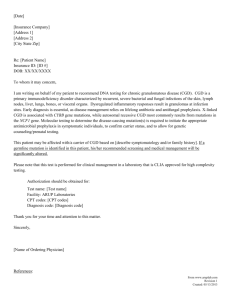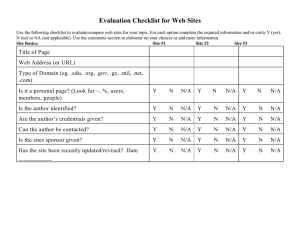CGD 160 - Advanced Fall 2013
advertisement
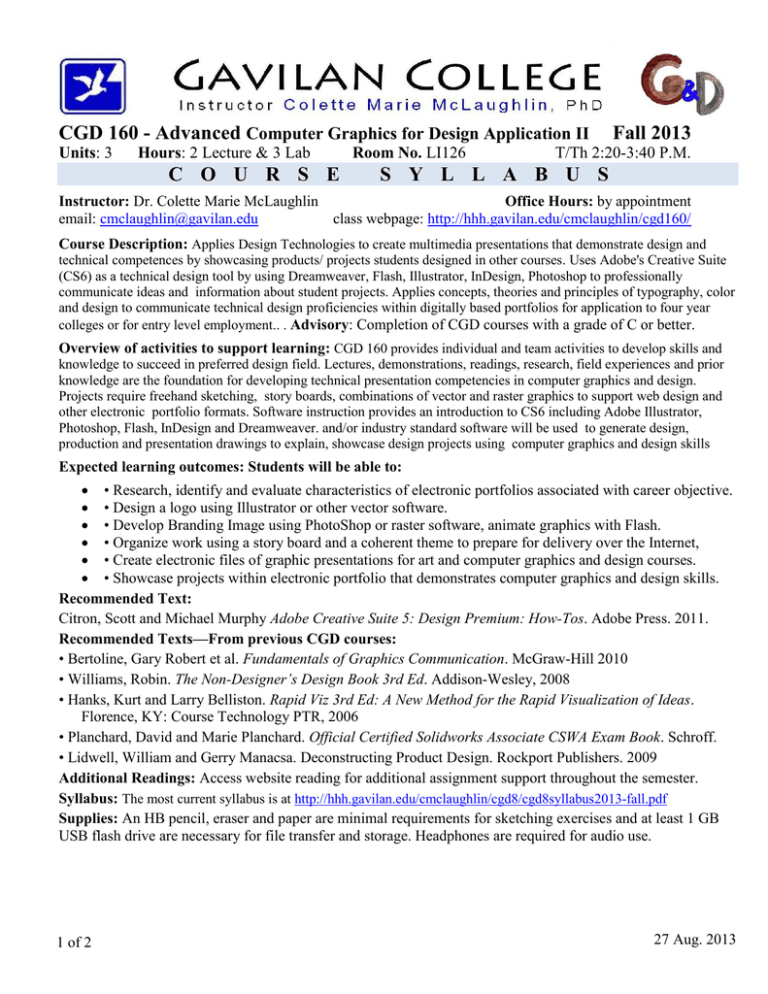
CGD 160 - Advanced Computer Graphics for Design Application II Units: 3 Hours: 2 Lecture & 3 Lab C O U R S E Room No. LI126 Fall 2013 T/Th 2:20-3:40 P.M. S Y L L A B U S Instructor: Dr. Colette Marie McLaughlin Office Hours: by appointment email: cmclaughlin@gavilan.edu class webpage: http://hhh.gavilan.edu/cmclaughlin/cgd160/ Course Description: Applies Design Technologies to create multimedia presentations that demonstrate design and technical competences by showcasing products/ projects students designed in other courses. Uses Adobe's Creative Suite (CS6) as a technical design tool by using Dreamweaver, Flash, Illustrator, InDesign, Photoshop to professionally communicate ideas and information about student projects. Applies concepts, theories and principles of typography, color and design to communicate technical design proficiencies within digitally based portfolios for application to four year colleges or for entry level employment.. . Advisory: Completion of CGD courses with a grade of C or better. Overview of activities to support learning: CGD 160 provides individual and team activities to develop skills and knowledge to succeed in preferred design field. Lectures, demonstrations, readings, research, field experiences and prior knowledge are the foundation for developing technical presentation competencies in computer graphics and design. Projects require freehand sketching, story boards, combinations of vector and raster graphics to support web design and other electronic portfolio formats. Software instruction provides an introduction to CS6 including Adobe Illustrator, Photoshop, Flash, InDesign and Dreamweaver. and/or industry standard software will be used to generate design, production and presentation drawings to explain, showcase design projects using computer graphics and design skills Expected learning outcomes: Students will be able to: • Research, identify and evaluate characteristics of electronic portfolios associated with career objective. • Design a logo using Illustrator or other vector software. • Develop Branding Image using PhotoShop or raster software, animate graphics with Flash. • Organize work using a story board and a coherent theme to prepare for delivery over the Internet, • Create electronic files of graphic presentations for art and computer graphics and design courses. • Showcase projects within electronic portfolio that demonstrates computer graphics and design skills. Recommended Text: Citron, Scott and Michael Murphy Adobe Creative Suite 5: Design Premium: How-Tos. Adobe Press. 2011. Recommended Texts—From previous CGD courses: • Bertoline, Gary Robert et al. Fundamentals of Graphics Communication. McGraw-Hill 2010 • Williams, Robin. The Non-Designer’s Design Book 3rd Ed. Addison-Wesley, 2008 • Hanks, Kurt and Larry Belliston. Rapid Viz 3rd Ed: A New Method for the Rapid Visualization of Ideas. Florence, KY: Course Technology PTR, 2006 • Planchard, David and Marie Planchard. Official Certified Solidworks Associate CSWA Exam Book. Schroff. • Lidwell, William and Gerry Manacsa. Deconstructing Product Design. Rockport Publishers. 2009 Additional Readings: Access website reading for additional assignment support throughout the semester. Syllabus: The most current syllabus is at http://hhh.gavilan.edu/cmclaughlin/cgd8/cgd8syllabus2013-fall.pdf Supplies: An HB pencil, eraser and paper are minimal requirements for sketching exercises and at least 1 GB USB flash drive are necessary for file transfer and storage. Headphones are required for audio use. 1 of 2 27 Aug. 2013 Computer Graphics Lab & Arranged Hours: Gavilan’s CGD 160 requires students to complete 2.33 arranged hours per week in addition to lecture to work on projects in and outside class. Computer Graphics Lab (CGD 110) is an interdisciplinary supervised lab that supports this requirement. CGD 110 lab provides technology to complete projects, practice computer graphic skills and obtain individualized computer assisted instruction to learn a wide range of other computer graphic programs. CGD 110 may be taken for credit. Evaluation/Grading: Your final grade is calculated using seven performance measures. Participation: credit for collaboration and contributions to your own and your peers’ success in class/lab. Homework: sketch assignments that demonstrate your ability to apply concepts discussed in class. Assignments: additional assignments to apply and practice Research Projects: assess your ability to find, apply and document relevant sources of information Design Projects: evaluates the development of your products during all design phases. Portfolio: grades the presentation of your projects in an electronic portfolio. Midterm and Final Exams: are design problems testing ability to demonstrate skills and concepts. Grades: Mastery of CGD learning outcomes is evaluated using multiple measures. For additional credit you may revise and resubmit by final exam. With instructor’s approval, you may enter into a contract to substitute equivalent individualized work for required projects and exercises. If you earn excellent participation your final grade be will rounded up should your final percentage fall within one percent of next grade. Study guides for review and practice will be provided prior to each exam. Evaluation information is further described below. Deadlines: Unless otherwise noted, in class, on iLearn or class homepage, all projects are to be submitted electronically in appropriate electronic form by 5 p.m. of due date (see web site). Other than extraordinary circumstances, a late assignment will be reduced one whole letter grade each week it is overdue. Last day to withdraw without receiving a W or letter grade is 7 Sept. Additional Gavilan deadlines are listed on Gavilan Calendar. Attendance Policy: Missing 5 hours of class, without prior arrangements, may result in you being dropped without credit. Additionally, being on time and in class is directly related to your participation grade. Honesty Policy: Students are expected to exercise academic honesty and integrity. Any form of cheating and plagiarism will result in disciplinary action and may include recommendation for dismissal. Other Policies: Students with special needs: If you require special services or arrangements due to hearing, visual, or other disability contact your instructor, counselor, or the Disability Resource Center. Occupational/Vocational Students: Limited English language skills will not be a barrier to admittance to and participation in Vocational Educational Programs. 2 of 2 27 Aug. 2013
